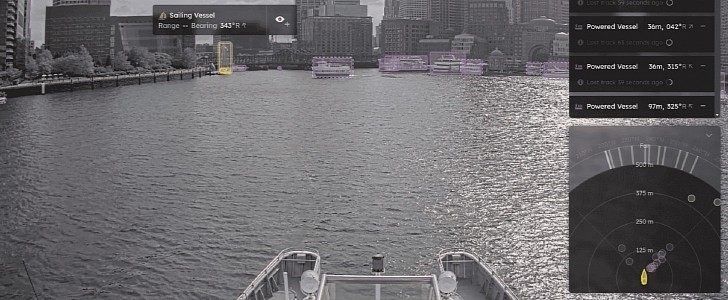Autonomous vessel software developer Sea Machines made the global headlines last year with its SM300 self-piloting system, which was used to operate the Nellie Bly. The smart boat took what was dubbed the world’s first 1,000-nautical mile autonomous voyage, with no crew on board. Now, the Boston-based company is back with another groundbreaking technology, described as the “biggest advancement in vessel navigation instrumentation since GPS.”
The new product is called AI-ris, which stands for artificial intelligence recognition and identification system. It is a computer-vision navigation sensor designed for marine industry applications and is meant to improve vessel safety. According to reports from the U.S. Coast Guard, 36 percent of all boating accidents reported in 2020 were caused by collisions and allisions, with human error or lack of focus being identified as the main causes.
As explained by Sea Machines, the new AI-ris uses cameras and AI-processing to detect, track, classify, and geolocate objects, vessel traffic, and any potential obstacles, equipping the crew with the best situational awareness and alerting the operator in case of any potentially dangerous situations.
The system can operate in almost any condition, day and night, and is designed to be “ever-alert.” It can be installed aboard existing vessels and on new builds as well.
Speaking about the benefits of the new system, Sea Machines CTO Trevor Vieweg claims the AI-ris surpasses the capabilities of existing marine sensor technologies such as radar and the automatic identification system (AIS). With its ability to detect, classify, and geolocate targets using its optical sensors, the AI-ris offers superior performance and higher levels of safety and reliability. In addition, Sea Machines also hopes that, in the future, the AI-ris will be able to help responders detect marine oil spills.
The new AI-ris was unveiled during the Seawork2022 event, the largest European commercial marine exhibition, which kicked off today, in Southampton, U.K. The system is now commercially available, but for more information, you have to contact Sea Machines.
As explained by Sea Machines, the new AI-ris uses cameras and AI-processing to detect, track, classify, and geolocate objects, vessel traffic, and any potential obstacles, equipping the crew with the best situational awareness and alerting the operator in case of any potentially dangerous situations.
The system can operate in almost any condition, day and night, and is designed to be “ever-alert.” It can be installed aboard existing vessels and on new builds as well.
Speaking about the benefits of the new system, Sea Machines CTO Trevor Vieweg claims the AI-ris surpasses the capabilities of existing marine sensor technologies such as radar and the automatic identification system (AIS). With its ability to detect, classify, and geolocate targets using its optical sensors, the AI-ris offers superior performance and higher levels of safety and reliability. In addition, Sea Machines also hopes that, in the future, the AI-ris will be able to help responders detect marine oil spills.
The new AI-ris was unveiled during the Seawork2022 event, the largest European commercial marine exhibition, which kicked off today, in Southampton, U.K. The system is now commercially available, but for more information, you have to contact Sea Machines.










